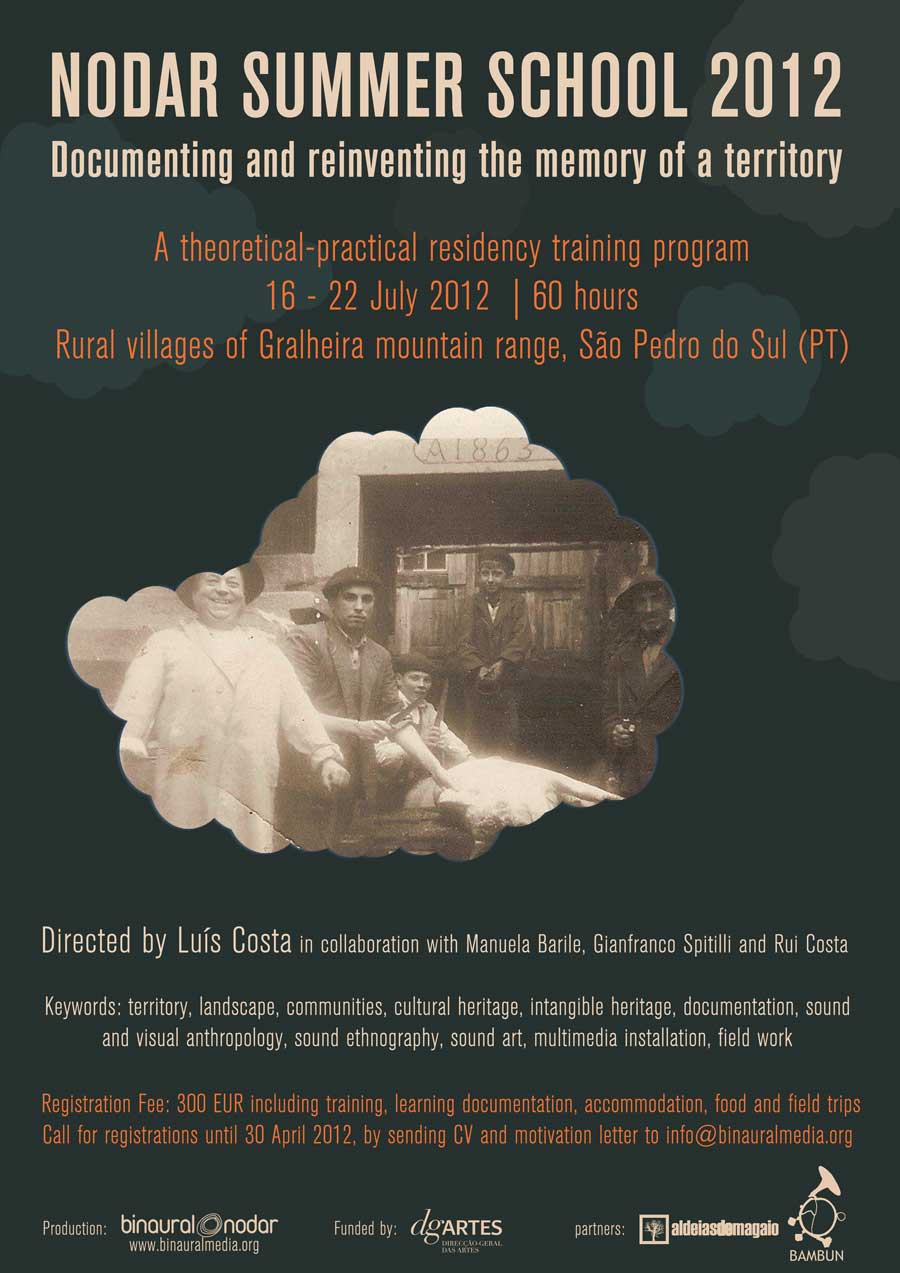Binaural / Nodar announces:
Open call for subscriptions:
Nodar Summer School 2012: Documenting and reinventing the memory of a territory
A theoretical and practical residency training program
16 – 22 July 2012 / 7 days / 60 hours
Locations: Rural villages of Gralheira Mountain Range, São Pedro do Sul
1. Orientation
Luis Costa (filmmaker / sound educator and president of Binaural/Nodar)
in collaboration with:
Manuela Barile (vocal performer / video artist and artistic director of Binaural/Nodar),
Gianfranco Spitilli (anthropologist / filmmaker and president of Bambun)
Rui Costa (sound artist and editorial director of Binaural/Nodar)
2. Keywords and recipients
Territory, landscape, community, cultural tradition, documentation, intangible heritage, sound and visual anthropology, sound ethnography, sound art, multi-media installation, land art
Recipients: Students / professionals / interest in social sciences, rural studies, earth sciences, contemporary art, sound and image. Regional or local technicians in the field of culture or heritage
3. Applications:
Applications accepted until April 30, 2012 by sending a CV / biography and letter of motivation to info-binauralmedia.org
Communication of the selected entrants: May 15, 2012
Maximum number of entrants: 12
4. Fees
Registration Fee: 300 Euros, including teaching materials, transportation for field trips, accommodation and food. Payment of 50% until 30 May 2012 and payment of the other 50% until the date before the beginning of the course.
5. Objectives and program
This is a time for the rediscovery of territories, its landscapes and heritage resources, both tangible and intangible. It is also a time of production and dissemination, sometimes massive and chaotic, of audiovisual material related to territories. However, there are many misconceptions on the loose about the what could really mean documenting the real using audiovisual media. We therefore need to reflect, with both depth and patience, upon a series of crucial aspects: what areas of knowledge are useful for documenting territories? which sensory aspects may be related to an enhanced experience of a place? What can and should be given back to the documented communities? How to escape immediate impressions and to capture in innovative ways the deep and subtle meanings of the cultural magma of a territory: its archaisms, changes, contaminations, contradictions, endogenous and exogenous social representations?
This 7-day intensive course offers a critical sharing of some of the methodologies and work practices developed since 2006 by Binaural/Nodar in the Gralheira mountain range (Center Portugal), based on a direct and continuous contact with rural communities and in an exploratory approach in terms of concepts, meanings and used media. The following are some of the issues to be addressed:
• The sense of place: philosophy and aesthetics of landscape. Discussion of authors and works.
• History, ethnography, anthropology and art as tools for multidisciplinary work. Discussion of authors and works.
• The ethics of images and sounds: a critical analysis of visual and sound works.
• The authenticity of communities: how to understand and deal with such representations, mythifications and simplifications.
• The multi-sensory approach to a territory as a way of enriching the experience
• Techniques and practicallities of field work. Planning field work, the role of time, mediation and involvement of local partners. Practice of field work in several villages.
• sound techniques applied to the knowledge of territories: practical exercises of sound recording in landscapes, work envirnoments, oral tradition and music, etc..
• Text, photographic and videographic documentation, digital mapping of information and the forms of integration between different media.
• Design of final multi-media multi-sensory installation.
• Talk with the inhabitants of what has been documented and created and its potential usefulness for the community.
• Organization of final documentation and discussion of future dissemination possibilities.
6. Language Course
The course will be taught in English with translation to Portuguese, Spanish and/or Italian when necessary.

